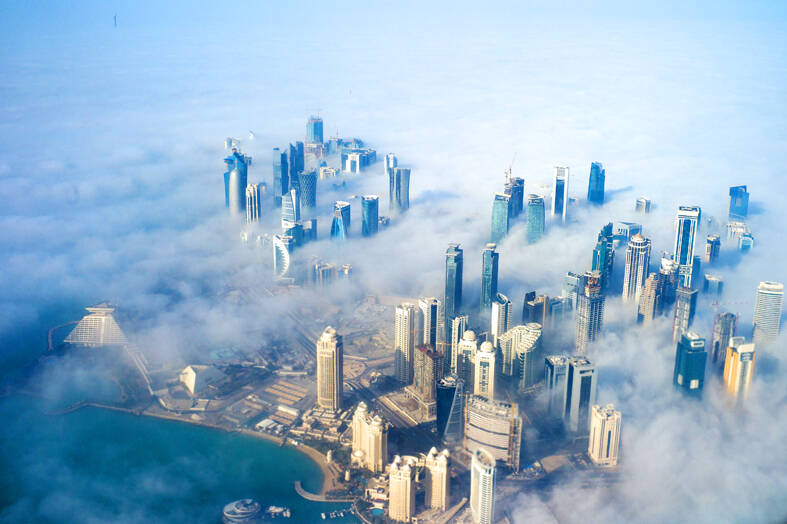Bahrain and Qatar on Wednesday agreed to restore diplomatic relations.
Bahrain had been the last holdout of four Arab nations that imposed a boycott on Qatar in 2017.
They were angered by Qatar’s alleged support for Islamist groups that rose to power in some countries following the 2011 Arab Spring protests, which the other Gulf nations viewed as terrorist organizations.

Photo: EPA
The boycott was lifted at the start of 2021, and Saudi Arabia, the United Arab Emirates and Egypt have restored ties with Qatar since then, with top leaders paying official visits in the past few months.
Bahrain and Qatar each issued official statements announcing the decision to restore relations following a meeting between their delegations at the Riyadh headquarters of the Gulf Cooperation Council, a six-nation bloc of which both are members.
CUTTING ALL LINKS
The four nations had severed all relations with Qatar, and at the height of the crisis there was even talk in local media of digging a trench along the 87km border between Qatar and Saudi Arabia, and filling it with nuclear waste.
However, the boycott had little effect on Qatar’s economy.
The tiny Gulf country, which hosted the soccer World Cup last year, is one of the wealthiest countries on Earth, owing to its vast natural gas reserves.
Turkey, which is also friendly to some groups deemed Islamist, stepped in to aid Qatar during the crisis.
Last month, Saudi Arabia and its main regional rival, Iran, agreed to restore diplomatic ties, which had been severed in 2016, in an agreement brokered by China.
The US welcomed “any efforts to de-escalate tensions in the Middle East region,” White House press secretary Karine Jean-Pierre said at the time.
Additional reporting by AFP

Kehinde Sanni spends his days smoothing out dents and repainting scratched bumpers in a modest autobody shop in Lagos. He has never left Nigeria, yet he speaks glowingly of Burkina Faso military leader Ibrahim Traore. “Nigeria needs someone like Ibrahim Traore of Burkina Faso. He is doing well for his country,” Sanni said. His admiration is shaped by a steady stream of viral videos, memes and social media posts — many misleading or outright false — portraying Traore as a fearless reformer who defied Western powers and reclaimed his country’s dignity. The Burkinabe strongman swept into power following a coup in September 2022

‘FRAGMENTING’: British politics have for a long time been dominated by the Labor Party and the Tories, but polls suggest that Reform now poses a significant challenge Hard-right upstarts Reform UK snatched a parliamentary seat from British Prime Minister Keir Starmer’s Labor Party yesterday in local elections that dealt a blow to the UK’s two establishment parties. Reform, led by anti-immigrant firebrand Nigel Farage, won the by-election in Runcorn and Helsby in northwest England by just six votes, as it picked up gains in other localities, including one mayoralty. The group’s strong showing continues momentum it built up at last year’s general election and appears to confirm a trend that the UK is entering an era of multi-party politics. “For the movement, for the party it’s a very, very big

ENTERTAINMENT: Rio officials have a history of organizing massive concerts on Copacabana Beach, with Madonna’s show drawing about 1.6 million fans last year Lady Gaga on Saturday night gave a free concert in front of 2 million fans who poured onto Copacabana Beach in Rio de Janeiro for the biggest show of her career. “Tonight, we’re making history... Thank you for making history with me,” Lady Gaga told a screaming crowd. The Mother Monster, as she is known, started the show at about 10:10pm local time with her 2011 song Bloody Mary. Cries of joy rose from the tightly packed fans who sang and danced shoulder-to-shoulder on the vast stretch of sand. Concert organizers said 2.1 million people attended the show. Lady Gaga

SUPPORT: The Australian prime minister promised to back Kyiv against Russia’s invasion, saying: ‘That’s my government’s position. It was yesterday. It still is’ Left-leaning Australian Prime Minister Anthony Albanese yesterday basked in his landslide election win, promising a “disciplined, orderly” government to confront cost-of-living pain and tariff turmoil. People clapped as the 62-year-old and his fiancee, Jodie Haydon, who visited his old inner Sydney haunt, Cafe Italia, surrounded by a crowd of jostling photographers and journalists. Albanese’s Labor Party is on course to win at least 83 seats in the 150-member parliament, partial results showed. Opposition leader Peter Dutton’s conservative Liberal-National coalition had just 38 seats, and other parties 12. Another 17 seats were still in doubt. “We will be a disciplined, orderly